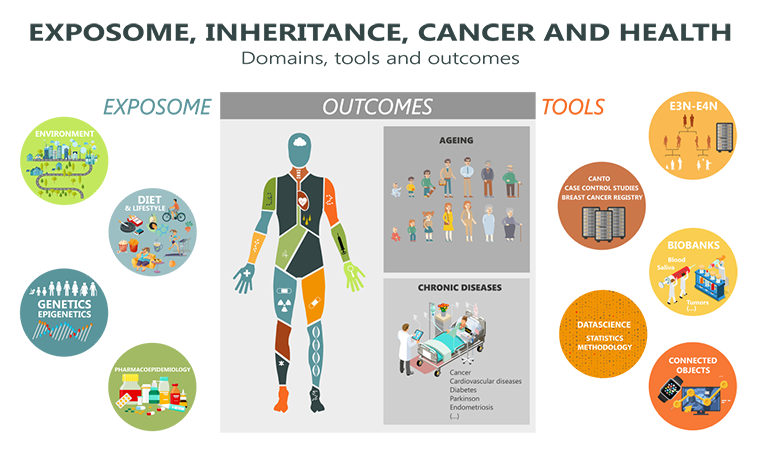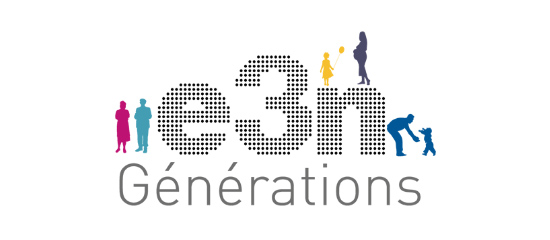Exposome, Inheritance, Cancer and Health
This team belongs to the UMR 1018/CESP - Centre de recherche en épidémiologie et en santé des populations
Our team investigates how the individual factors that constitute the exposome (health behaviors, lifestyle, occupation, environmental exposures to chemical or physical pollutants, biological characteristics, etc.), and the genetic background interact to influence the incidence and outcome of common chronic conditions such as cancer, cardio-metabolic conditions, and neuro-degenerative and ageing-related diseases.
Thus, the team aims at assessing in detail the joint exposure to multiple risk factors, and studying their relation to disease incidence over the lifecourse, as well as the influence on disease prognosis. One of our specificities is that we will be able to study the effect of the exposome across generations, and the transmission of traits within families across several generations.
This research program mainly relies on the E3N-Generations familial prospective cohort, large disease-specific case-control studies, and medico-administrative databases such as those from the health insurance schemes, MGEN and the French social security.

The E3N-Generations family cohort

Since 1990, the team has built and is in charge of the largest French prospective cohort on women’s health: E3N. The E3N cohort includes 98,995 women, born between 1925 and 1950 and affiliated to the MGEN (Mutuelle Générale de l'Education Nationale). Participants have been actively followed through biennial follow-up questionnaires. The E3N study has produced many results on women's health. E3N is the French component of the large European EPIC cohort (10 countries, 500,000 subjects).
Since 2014, the E3N cohort is expanding to family members of initial participants: E3N women’s children (Generation G2), grand-children (G3), and their children’s fathers (G1) are gradually being included in the study. In the end, the E3N-Generations family cohort will gather 200,000 people over three generations. There is only one other cohort of this size in the world that brings together families over three generations.
The E3N-Generations study aims to better understand the environmental and genetic risk factors for major chronic diseases. The E3N-Generations family cohort collects epidemiological, medical and biological data. Information is collected through self-administered questionnaires (health and lifestyle, including reproductive past, body size, smoking and alcohol consumptions, diet, physical activity, etc.), paper or web questionnaires according to generations.
The self-reported medical conditions are confirmed, validated and detailed through pathological reports and/or medico-administrative databases (for E3N-women: medication reimbursements and hospitalizations through MGEN). The project to match the entire E3N-Generations cohort to the SNDS (SNIIR-AM, PMSI, CépiDC) is ongoing.
Enlarging the cohort to the next generations is an opportunity to use innovative tools (connected devices, pollution sensors, etc.), which will make it a pioneering study in e-epidemiology.
The E3N-Generations cohort also includes biological collections: 25,000 blood samples and 47,000 saliva samples (for DNA) collected from first-generation women, and 18,000 saliva samples from first-generation men. We will complete this biobank from volunteers G2 and G3. A tumor bank is also being established.
The team aims to enhance these existing collections with blood, stool, hair and nail samples for an extremely well phenotyped sub-cohort of 50,000 individuals from 10,000 families. Funding is being sought for this major investment (€4.5m).
All these resources will enable us to investigate globally the influence of behavioural, environmental, biological, genetic, and epigenetic factors during different periods of life on major chronic diseases risk and progression (e.g. cancers, cardio-metabolic diseases, neurodegenerative diseases, asthma, depression, endometriosis, rheumatological diseases, ageing…).
The E3N-Generations cohort works as an open research infrastructure. The data, anonymized, are accessible to other academic researchers, under the supervision and approval of the Data Access Committee of the study.
- For more information: www.e3n-generations.fr
Group main research axes
- To identify and analyse the role of several factors, including hormonal, dietary genetic and epigenetic factors, in the occurrence of cancer and other major chronic diseases (diabetes, cardiovascular diseases, asthma, Parkinson, ...)
- To investigate the associations of major chronic diseases with lifestyle and metabolic factors (in particular diet, physical activity, use of hormonal treatments, reproductive factors, early life exposures, …)
- To study the impact of environmental and occupational exposures on health
- To analyse the interaction between genetic characteristics and these potential risk factors
- To assess the relationship between chronic diseases and several biological markers (diet, pollution, hormonal milieu, genetic polymorphisms, ...)
- To study the biological mechanisms related to cancer, cardiometabolic or neurodegenerative diseases and identify new biomarkers for prediction and early diagnosis
- To study the determinants and consequences of motor function decline, during normal and pathological ageing
- To study survival and life quality after the incidence of chronic diseases (cancer, diabetes, …)
- To study inheritance and the transmission of health determinants
Results
Major results of the research team describe the following associations:
- Hormonal treatments with the risk of breast, ovary and endometrial cancers, and melanoma
- Physical activity with breast cancer occurrence
- Intake of dietary fibre, meat, fish, calcium, heme iron with the risk of colorectal tumours
- Intake of lipids, fatty-acids, beta-carotene, alcohol, folate, vitamins, carbohydrates, and smoking with breast cancer risk
- Phytoestrogens (from diet and from dietary supplements) with hormone-dependant cancers (breast, endometrial, ovary)
- Vitamin D with breast and colorectal cancer risks
- Sun exposure with skin cancer risk
- Anthropometric measures, diet, environmental factors with asthma risk
- Body silhouette, menopausal hormone therapy, blood type, coffee, sugar-sweetened beverages or acid load intake with diabetes risk
- Environmental exposures (air pollution, exposure to endocrine disruptors, food contaminants, etc. ) and risks of major chronic diseases (cancer, diabetes… )
